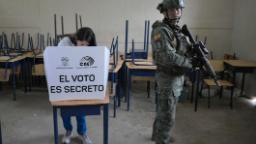
CNN
—
Center-right candidate Daniel Noboa, the 35-year-old son of a banana tycoon, will become Ecuador’s next president, following an election driven by concerns over rising violence and a worsening security situation in the Latin American nation.
More than 10 million people have voted in the presidential election, and data from the National Electoral Council of Ecuador (CNE) shows Noboa obtained 52.3% of the votes (4,829,130).
His main political rival, leftist candidate and first round front-runner Luisa González, obtained 47.7% of votes (4,404,014), the CNE said.
Noboa was a lawmaker before outgoing President Guillermo Lasso dissolved the legislature and called for early elections.
The Acción Democrática Nacional party’s candidate, he has pledged to create more work opportunities for the young, bring in more foreign investment, using technology to fight crime, and has suggested several anti-corruption measures including sentences for tax evasion.
Speaking to reporters after the result, Noboa thanked his wife, parents, and God for allowing him to serve his country.
“I also thank all those people who have been part of a new, young, improbable political project, a political project whose purpose was to give back a smile to the country,” he said.
“Starting tomorrow, Daniel Noboa, your president of the republic, starts working.”
His rival, González of the Movimiento Revolución Ciudadana party, a protégé of former leftist President Rafael Correa, ran on a promise to enhance public spending and social programs and wants to address the security crisis by fixing the root causes of violence, such as poverty and inequality.
González was the frontrunner in the first round of voting.
She conceded to Noboa after the result was announced, saying she would congratulate him on his victory.
“To the candidate now president-elect, we offer deep congratulations because it’s a democracy; we have never called for a city to be set on fire, we have never come out to shout fraud,” she said.
Security was tight throughout Sunday’s vote with tens of thousands of police officers and army personnel stationed at polling stations across the country.
Crime remained at the forefront of Ecuador’s run-off vote, months after the high-profile assassination of another presidential candidate, Fernando Villavicencio, who was slain days before the August 20 first-round poll.
The killing became a tragic symbol of the country’s worsening security situation, where rival criminal organizations have been meting out brutal and often public shows of violence in the country’s streets and prisons in their battle to control drug trafficking routes.
Voter turnout was “historic” at 82.33% despite initial security concerns, CNE president Diana Atamaint said after polls closed Sunday.
“The transmission of the results has been fluid and constant; the Ecuadorians have permanently followed the votes obtained by each of the candidates, which are the result of the popular will expressed at the polls,” she Atamaint after the results came out.
“We have complied with a historic electoral process. The country gave us this mission, and today, we say to Ecuador and the entire world, ‘task accomplished;’ today democracy won, today Ecuador won.”
Before Ecuador, a nation of nearly 17 million, was transformed into one of the most dangerous countries in the region, it was known as a relatively peaceful place that was nestled between two of the world’s largest narcotics producers, Peru and Colombia.
Its deep ports, dollarized economy, and corruption have since made it a key transit point for drugs making its way to consumers in the US and Europe. The mounting violence, paired with a lack of economic prospects, have also compelled many Ecuadorians to leave the country.
“We are not sure [what] will put an end to this because we cannot live with that fear” of crime, small business owner César Ortiz told CNN en Español in Quito ahead of the poll.
Ortiz said he hopes the new president will focus not just on security but on the economy because “there are so many people who are unemployed, that is why crime [is] abound.”
Whoever wins on Sunday may gain a cursed chalice, say analysts covering the region. “Governing Ecuador right now is hell – this presidency is designed to eliminate you from political life,” Freeman said.
The new president will have relatively little time to work on a solution to the country’s woes. They will hold office only until 2025, which would have been the end of Lasso’s term – a short window for even the most seasoned politician to turn things around in the country.








